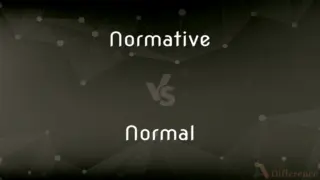Almost vs. Practically — What's the Difference?
Edited by Tayyaba Rehman — By Fiza Rafique — Updated on May 17, 2024
Almost indicates something is nearly completed or achieved, whereas practically suggests something is effectively true or close enough to be considered true despite not being exact.

Difference Between Almost and Practically
Table of Contents
ADVERTISEMENT
Key Differences
Almost is used to describe something that is nearly but not quite finished or achieved. For example, saying "I almost finished the book" means you came very close to finishing but didn’t complete it. Practically, on the other hand, is often used to convey that something is nearly the case to the extent that the difference is negligible. For instance, "It's practically done" implies that for all intents and purposes, it can be considered done.
Almost is more about approaching a specific goal or state, emphasizing the small gap remaining. Practically often carries a connotation of functional completeness despite minor missing details.
Almost conveys a sense of near completion with a clear sense of what remains undone. Practically, while also indicating near completion, emphasizes the functional or pragmatic aspect, downplaying the importance of what remains.
Comparison Chart
Meaning
Nearly but not completely
Nearly to the point of being effectively true
Usage
Emphasizes the remaining gap
Emphasizes sufficiency despite minor gaps
ADVERTISEMENT
Context
Can be precise about the shortfall
Focuses on practical completeness
Examples
Almost finished, almost there
Practically done, practically free
Connotation
Slightly less than
Close enough to be considered as
Compare with Definitions
Almost
Approaching a certain condition or state.
The soup is almost ready.
Practically
Almost or nearly as described.
The car is practically new.
Almost
Nearly but not entirely.
She almost won the race.
Practically
To a large extent; almost completely.
She practically lives at the office.
Almost
Very close to happening or being true.
He almost guessed the answer correctly.
Practically
In a useful or sensible way.
The design is practically efficient.
Almost
Not quite but close in degree or number.
It’s almost midnight.
Practically
Essentially, though not officially or exactly.
It’s practically impossible to get tickets.
Almost
Just short of a particular amount or degree.
I almost ate the whole pizza.
Practically
For all practical purposes; virtually.
The rules are practically nonexistent.
Almost
In set theory, when dealing with sets of infinite size, the term almost or nearly is used to refer to all but a negligible amount of elements in the set. The notion of "negligible" depends in the context, and may mean "of measure zero" (in a measure space), "countable" (when uncountably infinite sets are involved), or "finite" (when infinite sets are involved).For example: The set S = { n ∈ N | n ≥ k } {\displaystyle S=\{n\in \mathbb {N} \,|\,n\geq k\}} is almost N {\displaystyle \mathbb {N} } for any k {\displaystyle k} in N {\displaystyle \mathbb {N} } , because only finitely many natural numbers are less than k {\displaystyle k} .
Practically
Virtually; almost
The strike lasted practically a fortnight
The place was practically empty
Almost
Not quite; very nearly
He almost knocked Georgina over
The place was almost empty
Blues, jazz—he can play almost anything
Practically
In a practical manner
‘He might win,’ pointed out Emmeline practically
Almost
Slightly short of; not quite; nearly
Almost time to go.
Was almost asleep.
Had almost finished. See Usage Note at none.
Practically
All but; nearly; almost
He had practically finished his meal when I arrived.
Almost
Very close to, but not quite.
Practically
In a way that is practical
We planned the room practically for use as a study as well as a den.
Almost
(mathematics) Up to, except for a negligible set where negligible is not universally but contextually defined.
Almost all
Almost no
Practically
In practice; in effect or actuality, though possibly not officially.
Almost
A null set; except for a set of measure 0.
Almost everywhere
Almost nowhere
Almost certain
Almost sure
Practically
Almost completely; almost entirely
He was practically uneducated, barely able to read and write a simple sentence.
Almost
(informal) Something or someone that doesn't quite make it.
In all the submissions, they found four papers that were clearly worth publishing and another dozen almosts.
Practically
With respect to practices or a practice.
He wasn't very good with words or numbers; he was more of a practically minded person
He was practically educated and lacked theoretical depth.
Almost
Nearly; well nigh; all but; for the greatest part.
Almost thou persuadest me to be a Christian.
Practically
In a practical way; not theoretically; really; as, to look at things practically; practically worthless.
Almost
(of actions or states) slightly short of or not quite accomplished; `near' is sometimes used informally for `nearly' and `most' is sometimes used informally for `almost';
The job is (just) about done
The baby was almost asleep when the alarm sounded
We're almost finished
The car all but ran her down
He nearly fainted
Talked for nigh onto 2 hours
The recording is well-nigh perfect
Virtually all the parties signed the contract
I was near exhausted by the run
Most everyone agrees
Practically
By means of practice or use; by experience or experiment; as, practically wise or skillful; practically acquainted with a subject.
Practically
In practice or use; as, a medicine practically safe; theoretically wrong, but practically right.
Practically
Almost.
Practically
Almost;
He was practically the only guest at the party
Practically
(degree adverb used before a noun phrase) for all practical purposes but not completely;
Much the same thing happened every time
Common Curiosities
What does "almost" imply?
"Almost" implies something is nearly but not fully completed or achieved.
Does "practically" indicate exactness?
No, "practically" indicates functional completeness without exactness.
Does "practically" imply exaggeration?
Sometimes, it can imply something is true for all practical purposes, though not exactly.
Is "almost" used in formal contexts?
Yes, "almost" is appropriate in both formal and informal contexts.
Is "practically" often used in spoken language?
Yes, especially in contexts emphasizing practical outcomes.
How is "practically" different from "almost"?
"Practically" suggests something is close enough to be effectively true, focusing on functional sufficiency.
Can "almost" and "practically" be used interchangeably?
Not always; "almost" emphasizes the small remaining gap, while "practically" emphasizes near-completeness for practical purposes.
Can "almost" refer to quantities?
Yes, e.g., "I almost drank the whole bottle."
Can "almost" and "practically" both describe actions?
Yes, but they convey different nuances.
Can "almost" refer to time?
Yes, e.g., "It’s almost midnight."
Do "almost" and "practically" convey a sense of near completion?
Yes, both imply something is nearly finished, with "practically" focusing more on functional sufficiency.
How does "almost" handle degrees or extents?
It shows something is very close to a certain degree, e.g., "almost full."
Can "practically" be synonymous with "effectively"?
Yes, both can mean nearly the same in practical terms.
Does "practically" downplay the importance of minor details?
Yes, it focuses on the overall practical outcome.
Is "almost" suitable for emotional expressions?
Yes, e.g., "I almost cried."
Share Your Discovery

Previous Comparison
Kimono vs. Ruana
Next Comparison
Normative vs. NormalAuthor Spotlight
Written by
Fiza RafiqueFiza Rafique is a skilled content writer at AskDifference.com, where she meticulously refines and enhances written pieces. Drawing from her vast editorial expertise, Fiza ensures clarity, accuracy, and precision in every article. Passionate about language, she continually seeks to elevate the quality of content for readers worldwide.
Edited by
Tayyaba RehmanTayyaba Rehman is a distinguished writer, currently serving as a primary contributor to askdifference.com. As a researcher in semantics and etymology, Tayyaba's passion for the complexity of languages and their distinctions has found a perfect home on the platform. Tayyaba delves into the intricacies of language, distinguishing between commonly confused words and phrases, thereby providing clarity for readers worldwide.












































